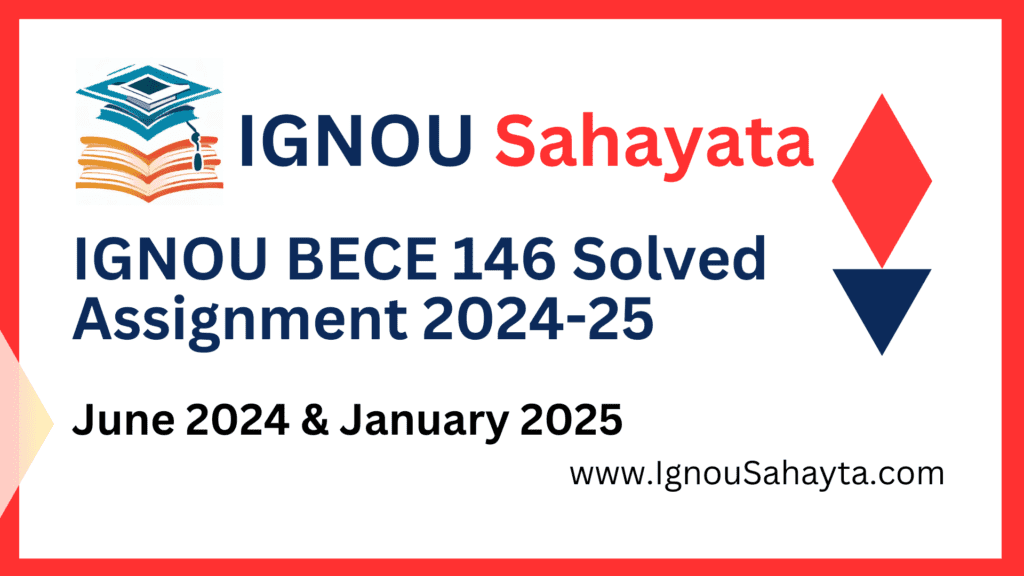Presenting the most recent update to our collection of IGNOU BECE 146 Solved Assignment 2024–25 PDF Download resources! You are at the correct location if you are enrolled in the BECE 146 course for the Indira Gandhi National Open University (IGNOU) Bachelor of Arts (General) program. English and Hindi-language assignments are available from us. You may approach the problems this course presents with confidence and accuracy if you use this painstakingly created Solved Assignment PDF.

We explore the fundamental ideas, assignments, and concepts that underpin this course as we delve into the details of IGNOU BECE 146 in this extensive guide. Our Solved Assignment PDF offers thorough answers and insights to any problems you may be having with challenging subjects or looking for clarification on assignment criteria.
The IGNOU BECE 146 Solved Assignment 2024–25 PDF Download gives you access to professionally written answers that meet IGNOU requirements. Bid farewell to ambiguity and doubt and welcome to a methodical approach to learning your content and succeeding in your academic endeavors.
Click To Download Full IGNOU BECE 146 Solved Assignment
BECE 146 Solved Assignment 2024-25 Hindi Medium
BECE 146 Solved Assignment 2024-25 English Medium
IGNOU BECE 146 Solved Assignment 2024-25
The BECE 146 course, titled Indian Economy II, is a continuation of BECE 145 and delves into advanced topics within the Indian economic landscape. This course focuses on current economic challenges, policy responses, and growth strategies that shape the future of India’s economy. Students engage with critical issues like poverty, income inequality, unemployment, and public finance, learning to assess and evaluate the effectiveness of various government initiatives aimed at addressing these pressing issues.
A significant component of the BECE 146 assignment revolves around understanding economic reforms and their impact on different sections of society. Students explore post-liberalization policies and how they have influenced areas such as foreign direct investment (FDI), trade policies, and financial regulations. By studying reforms in sectors like banking, infrastructure, and digitalization, students gain a nuanced understanding of the changes that have contributed to making India one of the fastest-growing economies. This exploration allows them to analyze how reforms impact both the economy and social equity.
Another key aspect of the assignment is studying India’s approach to social and economic inclusivity. Topics like poverty alleviation programs, rural development schemes, and employment generation initiatives are essential components. Students may examine the effectiveness of flagship programs such as the Mahatma Gandhi National Rural Employment Guarantee Act (MGNREGA) or Pradhan Mantri Jan Dhan Yojana in providing economic support to disadvantaged populations. Through this study, students learn to evaluate government programs on criteria such as inclusivity, efficiency, and impact on socio-economic development.
The course also covers India’s economic challenges in a globalized context, including discussions on trade dynamics, export-import policies, and the role of international organizations. The assignment may require students to analyze the effects of India’s trade relations with major economies and regional partnerships, such as BRICS and ASEAN. By understanding how global market forces interact with domestic policies, students are better equipped to assess the economic strategies that align with India’s long-term development goals.
In essence, BECE 146 provides students with a comprehensive look at India’s economic framework and the intricate policies influencing its progress. Through assignments, students delve deeply into the social and structural complexities of the economy, equipping them with analytical skills necessary for understanding and contributing to India’s future economic path. This course is valuable for those pursuing careers in economics, public policy, and international development, as it fosters a holistic understanding of the dynamic interplay between economic growth and social equity.